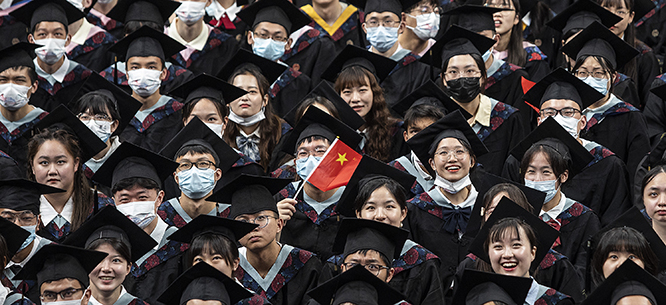Gaokao Losers
Gaokao Losers
In China, academic competition has become a kind of faith, providing values and a sense of purpose to its acolytes.

Other Rivers: A Chinese Education
by Peter Hessler
Penguin Press, 2024, 464 pp.
In River Town: Two Years on the Yangtze, Peter Hessler explored the novelty of being a foreign teacher in Fuling, China, in the mid-nineties. Most of his students were among the first generation in their family to attend college, and they hadn’t met an American before. They were enthusiastic about foreign culture and the Chicago Bulls, but also keen to educate Hessler (or He Wei, as he is known in Chinese) about their country’s customs. They offered him their friendship, in many cases corresponding with him for decades after he returned to the United States and became a journalist. He encouraged them to talk about the farming roots of their families, their ideas about free speech, and their hopes and dreams, sometimes by introducing the topics in disguise.
In class, students debated planned-birth policies and the degree of freedom afforded to people in the United States compared with China, and Hessler later gave one curious student a Newsweek article about the Tiananmen protests; other students modeled a performance of Don Quixote on an incompetent Communist Party member. A student who chose the name “Ker” and who had a “face tanned and weathered by the Sichuan sun” wrote a compelling narrative influenced by his time on his family’s farm, conjuring his ambition and the specter of the central government:
I’m working in the fields. The ox suddenly becomes a machine with an ox head. So I finish my task ahead of time. Because of that I am recommended to be the leader of our town. Then I go to Beijing by air to report my deeds to President Jiang Zemin. He doesn’t believe it’s true, because he’s never seen a machine with an ox head. He orders that I be sent to prison. On my way to prison, my ox appears. It becomes a train with an ox head.
Hessler was not always impressed by his students’ writing. In a textbook essay on the advantages and disadvantages of constructing the Three Gorges Dam, a project that would submerge parts of Fuling and much of the surrounding land, the author argues in favor of the development using a Chinese proverb: “We should not give up eating for fear of choking.” To Hessler’s dismay, these words became standard in the students’ assignments, an example that captures the pitfalls of an education that prizes the use of elegant set phrases in writing.
In Hessler’s new book, Other Rivers: A Chinese Education, the cliches have disappeared. More than twenty years later, at Sichuan University, Hessler finds that the English used in the writing samples submitted to join his class “tended to be slightly formal, but it wasn’t stiff; there were moments of emotion and exuberance.” Writing by rote no longer has the same currency, and there have been other changes. In interviews, the Sichuan ...
Subscribe now to read the full article
Online OnlyFor just $19.95 a year, get access to new issues and decades' worth of archives on our site.
|
Print + OnlineFor $35 a year, get new issues delivered to your door and access to our full online archives.
|






